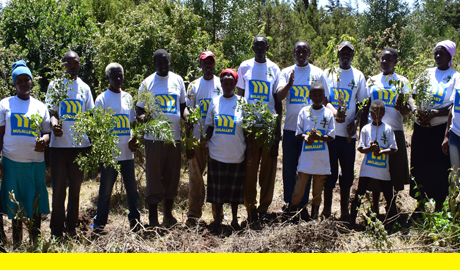


Mulalley is proud to announce that we have retained our carbon neutrality status for the third year running and was the first organisation in the UK to submit our ESOS* Phase 2 notification of compliance with the Environment Agency.
Unavoidable carbon emissions have been offset by supporting four projects from around the world, which reduce global emissions by an equivalent amount to that emitted by the company.
Mulalley’s total carbon footprint has decreased by 16.1% compared to the previous year. This is due to a reduction across all elements, although the most notable reduction relates to the decrease in travel emissions. The scope of reporting includes all business operations under green-house gas (GHG) Scopes 1 and 2.
Mulalley has had a robust, independent assessment of their carbon emissions completed by Carbon Footprint Ltd. Sustainability is an important consideration for Mulalley: Managing carbon aligns with Mulalley’s ISO 50001 (energy management) accreditation, compliance with the Energy Savings Opportunity Scheme (ESOS) and membership of the Considerate Constructors Scheme (CCS).
The chosen carbon offset projects are all internationally certified and align with the UN Sustainable Development Goals that aim to end poverty, protect the planet and ensure prosperity for all. Those most relevant to Mulalley and the company’s values include climate action, responsible consumption and production, sustainable cities and communities. This year’s projects bring Mulalley’s total carbon offsetting to in excess of 5000 tonnes of CO2e.
As well as having a local and global environmental benefit, the projects also bring social and economic benefits to communities.
Company Director Eamon O’Malley said “We are extremely pleased to retain our carbon neutral status which highlights our commitment to reducing our environmental impact. We will continue to monitor our carbon footprint and reduce our own energy consumption, as we work towards ensuring compliance with the new Streamlined Energy & Carbon Reporting (SECR) which came into effect in April 2019.”
Katie Elmer, ESOS Lead Assessor and Senior Sustainability Consultant at Carbon Footprint Ltd said “This year’s 1,734 tonnes being offset adds to the previously offset 3,651 tonnes of CO2e by supporting a number of projects, which includes renewable energy in India and Chile, borehole rehabilitation in Uganda, and household cookstoves on India. This is a really great achievement that I’m sure your customers and stakeholders will have noticed.”
The four chosen carbon offset projects are:
Kenya Tree Planting and Protecting the Amazon:
This project provides an opportunity to plant trees in Kenya as well as helping to protect the Amazon Rainforest – the largest remaining rainforest in the world. The Amazon is known for its amazing biodiversity; containing 10% of all species, including many endangered species.
For each tCO2 being offset, one native tree is planted in the Great Rift Valley, Kenya and an additional tCO2 is offset through the Brazilian Amazon Verified Carbon Standard (VCS) Reduced Emissions from Deforestation and Degradation (REDD) project to guarantee the emission reductions.
Borehole in Uganda:
This project works with local communities to identify and repair broken boreholes. As well as health benefits, communities no longer need to boil water before drinking, saving firewood and preventing the release of carbon emissions. This will be the very first programme to implement the new Gender Equality methodology from the Gold Standard.
Solar Power in India:
Co-ordinated by the ACME Group and based in India, this bundled project supports the installation of grid-connected renewable energy sources (namely solar PV cells), supplying energy into the Indian National Grid. The project provides sustainable employment (reducing poverty), improved healthcare, sanitation and educational benefit to the communities.
* ESOS - The Energy Savings Opportunity Scheme, requires large organisations in the UK to undertake mandatory assessments looking at energy use and energy efficiency opportunities at least once every four years - and this must cover transport as well as buildings and process energy usage.
Copyright © - All Rights Reserved - Mulalley - Disclaimer - Cookie regulation
